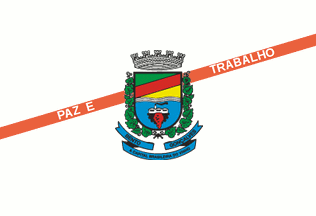
This page is part of © FOTW Flags Of The World website
Bento Gonçalves, Rio Grande do Sul (Brazil)
Last modified: 2012-02-11 by ian macdonald
Keywords: rio grande do sul | bento gonçalves |
Links: FOTW homepage |
search |
disclaimer and copyright |
write us |
mirrors
 image by Dirk Schönberger,
4
January 2012
image by Dirk Schönberger,
4
January 2012
Source:
http://www.bentogoncalves.rs.gov.br/003/00318005.asp?ttCD_CHAVE=49748
See also:
Description of the Flag
A white field with the municipal arms centred and extending from the red diagonal in the arms a red stripe extending across the flag, and bearing the words PAZ E TRABALHO.
Official website at http://www.bentogoncalves.rs.gov.br
Dirk Schönberger,
4 January 2012
The municipality of Bento Gonçalves (107,341 inhabitants in 2010; 382.5
sq. km) is located in northeastern Rio Grande do Sul, 124 km of Porto Alegre.
In 2003, Bento Gonçalves had the highest Index of Human Development in Rio
Grande do Sul and the 6th in Brazil.
Bento Gonçalves was founded in 1870,
as Colônia Dona Isabel. The settlement had been known before as Cruzinha, for
a rustic cross carved on the tomb; it was then a small trade and barter post
for gauchos. On 24 December 1875, the first Italian colonists, that would
develop the town and introduce wine-growing in the region, arrived from
Lombardy and Venetia. On 11 October 1890, Colônia Dona Isabel was made a
municipality independent of Montenegro by Act No. 474. The new municipality
was renamed Bento Gonçalves, for General General Bento Gonçalves da Silva
(1788-1847), a leader of the War of the Ragamuffins (1835-1845) and the
President of the Piratini Republic (1836-1845). The Italian fighter Giuseppe
Garibaldi (1807-1882) had his first military experience during the revolt.
The flag of Bento Gonçalves is prescribed by Municipal Law No. 285,
adopted on 23 September 1968. It is made of a white rectangle with, in the
middle, the municipal coat of arms and a diagonal red stripe continuing the
red stripe on the coat of arms, charged with the writing 'Paz e Trabalho"
(Peace and Work). The flag suggests that peace and commitment to work are the
unique factor of progress of the municipality.
The coat of arms of
Bento Gonçalves is prescribed by Municipal Law No. 216, adopted on 12
December 1966. Its colors and elements recall the industrial development of
the municipality, wine and its people's dynamism and organization. The
chief of the arms is made of the flag of Rio Grande do Sul, arms excluded
(that is, the flag of the Piratini Republic). It is separated by three white
waves from the main blue field, charged with a bunch of grapes ensigned with
a white factory. The grapes recall that Bento Gonçalves is Brazil's Wine
Capital and the seat of the National Wine Festival (Fenhavino), organized for
the first time in 1967.
See also
Rio Grande Republic
Ivan Sache, 6 January
2012